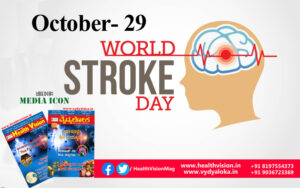Stroke can be prevented by keeping one healthy with simple change in habits, eating healthy, regular walking or any fitness routine. Many factors such as obesity, uncontrolled diabetes, high blood pressure, smoking, physical inactivity increases the chance of stroke.


As the age increases one is more susceptible to having a stroke and also a strong family history increases the risk. Many factors such as obesity, diabetes, high blood pressure, smoking, physical inactivity increases the incidence of stroke. But there are ways one can prevent stroke attack or in medical terms cerebero vascular accident.
Many factors such as obesity, uncontrolled diabetes, high blood pressure, smoking, physical inactivity increases the chance of stroke. Simple change in habits, eating healthy, regular walking or any fitness routine can go a long way in keeping one healthy to prevent stroke.
Stroke – Risk factors:
1. Maintaining blood pressure is important for your vascular health to prevent the incidence of a stroke attack. If an individual is hypertensive or having high blood pressure the stroke risk is higher, hence regular monitoring of B. P and taking medications regularly as prescribed by the doctor for blood pressure is important. Stopping medications if the blood pressure is under control without consulting a medical professional or self-medicating is dangerous and will have serious consequences.
2. “Lose Weight”- This is repeated for prevention of many diseases but more so for stroke incident as obesity and especially abdominal obesity or visceral fat increases stroke risk. Strive for weight loss gradually and do not follow any FAD diets. A Balanced calorie deficit diet with physical activity will have an effective healthy weight loss than YO YO dieting. Consult qualified health professionals for customized diet recommendation and fitness routine which suits your work schedule and daily lifestyle.
3. Keep your Blood sugar under control by taking the right food loaded with complex carbohydrates, fiber in the form of vegetables and fruits of low glycemic index and balancing it with exercise like walking. Take your medicines or insulin regularly as prescribed by your doctor and regular monitoring of blood sugars will also help you to keep a track of your fluctuations in sugars. High blood sugar damages the blood vessels and diabetics are at an increased risk.
4. Quit smoking and take the help of a counselor to break the habit and find alternatives to break the craving. Act fast and do not delay as you know each day this dangerous habit is slowly spoiling your lungs and making you more susceptible in this pandemic situation.
5. Physical inactivity and stress are also a risk and simple exercises and fitness routine like stretches and brisk walking in the morning sunlight will do wonders to your overall health. Yoga and meditation are the best proven stress busters as deep breathing will enhance your respiratory health and help you relax. Maintaining a Food and exercise dairy will also motivate and keep you aware of your daily healthy habits.
6. Act FAST and do not delay to get into a healthy lifestyle to not only prevent stroke but also many other diseases to live a healthy and active life.
Ways to prevent stroke:


2. Increase fiber intake by including 1-2 servings of vegetables with your lunch and dinner in any form such as dry curries, low fat vegetable gravies, salads, raita or a traditional vegetable dish which you are familiar with in your region.
3. Seasonal Fruits to be included two- three times a day. Can be had with your breakfast or a mid-morning or evening healthy snack or after dinner.
4. Exercise- Incorporate a simple brisk walk for 30-40 minutes or in two 20 minute sessions which suits your daily schedule.
5. Yoga and meditation, listening to music of your choice, laughing or interacting with a friend, playing board games and spending time with family are great stress busters


Sreemathy Venkatraman
Clinical Nutritionist
BRAINS Hospital











